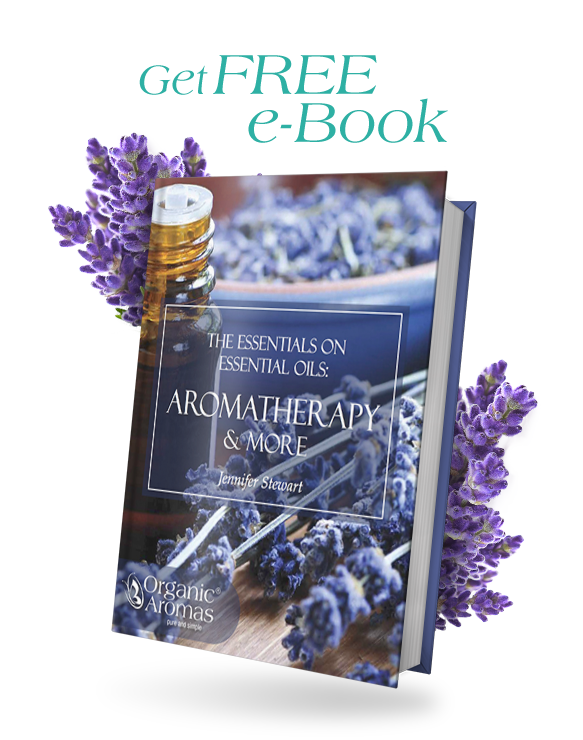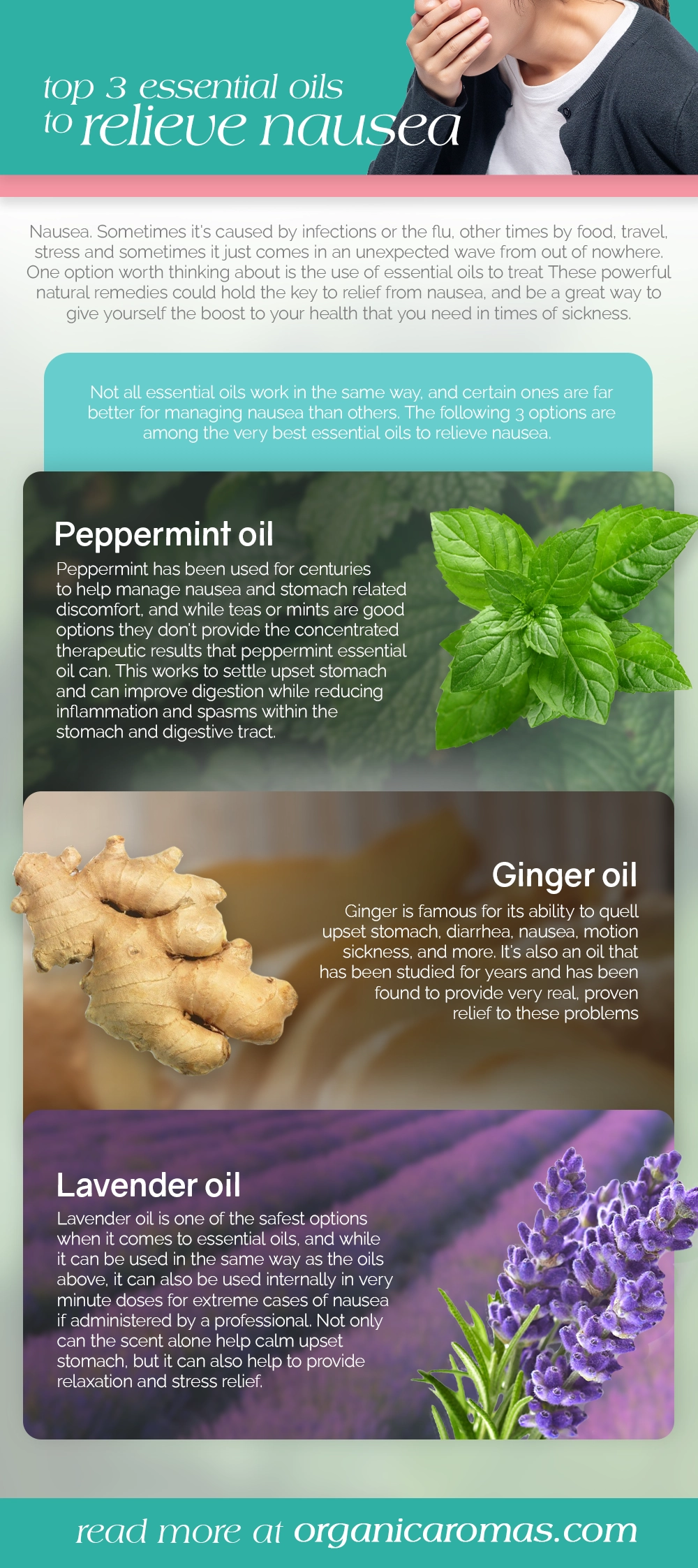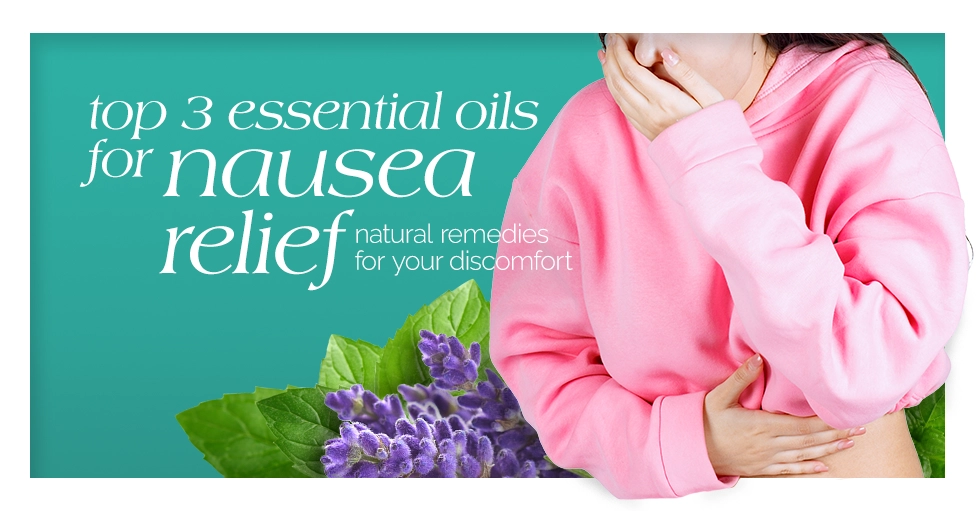Top 3 Essential Oils for Nausea Relief: Natural Remedies for Your Discomfort
Navigating the waves of nausea can feel overwhelming. Thankfully, essential oils for nausea are a tried-and-tested remedy to calm the storm. Here we explore the what, why, and how of choosing and using the right essential oils for immediate and natural comfort. Unpack the benefits and uses of each recommended oil without any promotional noise, equipping you with knowledge that can offer easy and quick relief.
Essential Oils for Nausea Relief: Key Takeaways
- Nausea is caused by a variety of factors including stomach infections, food allergies, GERD, psychological stress, and can lead to dehydration if prolonged.
- Aromatherapy and the use of essential oils like peppermint, ginger, and lavender can be effective natural remedies for nausea, working through anti-inflammatory, antispasmodic, antioxidant, and antiemetic properties.
- Essential oils should be used through inhalation or topical application with a carrier oil, not ingested, and with caution around children, pets, and during pregnancy.
- Using a nebulizing diffuser with one of the essentials oils mentioned in this article is a quick and effective way to get natural relief from nausea.
Understanding Nausea: Causes and Symptoms

Nausea is a sensation that many of us have experienced at one point or another. It’s that unsettling feeling in your stomach that often precedes vomiting. This discomfort can stem from a variety of sources. Common causes include:
- Food allergies
- Infections of the stomach or bowels
- GERD (Gastroesophageal reflux disease)
- Medical treatments such as chemotherapy
Severe pain, migraines, appendicitis, intestinal blockages, ulcers, and toxin ingestion can also lead to nausea.
The symptoms of nausea are not just limited to that queasy feeling. They can include an upset stomach, an urge to vomit, and in some cases, actual vomiting. Understanding these symptoms is crucial for treating nausea effectively. Moreover, prolonged episodes of nausea can lead to dehydration, characterized by crying without tears, dry mouth, increased thirst, sunken eyes, and skin that doesn’t bounce back when pinched. Recognizing these signs early can help in managing and mitigating the effects of dehydration.
Nausea can also be a result of psychological factors. Anxiety-induced nausea is quite common, where the sensation of feeling nauseous is triggered by stress or anxiety. Understanding the multifaceted nature of nausea, from physical to psychological causes, is the first step in finding the right remedy to alleviate nausea effectively.
Demonstrating the Efficacy of Essential Oils for Nausea Relief

Research supports the use of aromatherapy for nausea relief. A study published in Anesthesia & Analgesia found that patients who inhaled a blend of essential oils, including ginger, spearmint, peppermint, and cardamom, reported less postoperative nausea than those who inhaled a placebo2.
The exact mechanism that makes aromatherapy effective for nausea isn’t fully understood, but it’s believed to be related to how our brains process smells. Our olfactory system has a direct connection to the brain’s centers for emotion and memory, the amygdala and the hippocampus. When we smell something, signals are sent to these areas, affecting our emotions and physical sensations. Smells can trigger relaxation or stimulation, and in the case of specific scents, they can help ease feelings of nausea.

Sign Up to Get Your FREE
e-Book Here…
- Essential oils, including peppermint and ginger, have demonstrated significant reduction in postoperative nausea and vomiting, reducing the need for antiemetic medications4.
- A review of scientific evidence indicates that inhaled vapors of peppermint or ginger essential oils reduce the severity of nausea and vomiting, improving patient satisfaction5.
- Peppermint essential oil inhalation significantly reduces nausea and vomiting after cardiac surgery6.
These studies collectively highlight the effectiveness of essential oils in managing and alleviating nausea, providing a natural and complementary approach to traditional antiemetic treatments.
The Role of Aromatherapy in Treating Nausea

Aromatherapy has been a cornerstone of natural remedies for centuries, with its roots deeply embedded in traditional medicine. Essential oils are at the heart of this practice, providing relief for a multitude of ailments, including nausea. But how exactly do these oils work their magic? The answer lies in the brain’s amygdala. When you inhale essential oils, the aromatic molecules travel directly to this part of the brain, influencing emotions and, consequently, the sensation of nausea.
The therapeutic properties of essential oils are what make them so effective in treating nausea. These oils possess:
- Anti-inflammatory properties
- Antispasmodic properties
- Antioxidant properties
- Antiemetic properties
These properties collectively help to alleviate nausea and vomiting. For instance, the antiemetic properties help prevent vomiting, while anti-inflammatory properties reduce stomach discomfort.
Inhalation of oils like peppermint and ginger can provide quick relief by calming the digestive system and easing stomach discomfort. The beauty of aromatherapy lies in its ability to offer a holistic approach to nausea relief, integrating both physical and emotional well-being. This makes essential oils a valuable tool in managing nausea, whether it’s due to morning sickness, motion sickness, or post-operative nausea.
Top Essential Oils for Combating Nausea
When it comes to combating nausea, not all essential oils are created equal. Some oils stand out for their potent effects and versatility. Among the top contenders are:
- Peppermint essential oil: renowned for its cooling scent and ability to relax gastric muscles, making it a popular choice for immediate nausea relief.
- Ginger essential oil: known for its anti-inflammatory properties and ability to soothe the digestive system, making it effective in relieving nausea.
- Lavender essential oil: has calming and relaxing properties, which can help reduce feelings of nausea and promote overall well-being.
These oils have been extensively studied and are known for their effectiveness in providing nausea relief.
Ginger oil, on the other hand, is celebrated for its soothing effects on the digestive system. It’s particularly effective for nausea related to post-surgery and pregnancy. Lavender oil offers a different kind of relief, focusing on calming the mind and body, which is especially beneficial for anxiety-induced nausea.
Using a diffuser to disperse these oils can be an excellent way to experience their benefits. The continuous release of calming scents can aid in relaxation and potentially reduce nausea.
Now, let’s delve deeper into the specific benefits of each of these top essential oils.
Peppermint Oil: A Cooling Scent for Gastric Muscles
Peppermint oil is one of the most effective essential oils for nausea relief, thanks to its antiemetic and antispasmodic properties. The cooling scent of peppermint oil can do wonders for your digestive system. When inhaled, it helps relax the gastric muscles, preventing muscle cramping and offering quick relief from nausea. Some benefits of using peppermint oil for nausea relief include:
- Antiemetic properties
- Antispasmodic properties
- Relaxation of gastric muscles
- Prevention of muscle cramping
- Quick relief from nausea
In addition to its antiemetic properties, peppermint oil is also known for easing stomach discomfort and reducing bloating. This makes it a versatile option for those dealing with various types of nausea. The refreshing scent of peppermint oil can also act as a mood lifter, making you feel better overall.
For those who suffer from frequent nausea, inhaling peppermint oil directly or applying it to pressure points can provide fast and effective relief. The ability of peppermint oil to kill bacteria also adds to its list of benefits, making it a must-have in your natural remedy toolkit.

Ginger Oil: Soothing Digestive Aid
Ginger oil, one of the popular ginger essential oils, is another powerhouse in the realm of essential oils for nausea relief. This oil has been recognized for its promising results as a natural remedy for nausea. It’s particularly effective in treating various digestive issues, making it a go-to for those suffering from stomach discomfort. Some benefits of ginger oil include:
- Reducing nausea and vomiting
- Relieving indigestion and bloating
- Easing menstrual cramps
- Alleviating muscle pain and soreness
Ginger oil is especially valuable for post-surgery patients and pregnant women dealing with nausea and vomiting. Its soothing digestive properties help lessen the severity of these symptoms, providing much-needed relief. Whether used in a diffuser or applied topically, ginger oil can make a significant difference in managing nausea.
Lavender Oil: Calming the Mind and Body
Lavender oil is renowned for its relaxing benefits, making it an excellent choice for treating anxiety-induced nausea. When nausea is triggered by stress or anxiety, inhaling lavender oil can help relax the mind, providing significant relief. Its soothing properties extend beyond just the mind, offering physical comfort as well. Some benefits of lavender oil for treating nausea include:
- Relaxing the mind and reducing stress and anxiety
- Promoting a sense of calm and relaxation
- Easing digestive discomfort and reducing nausea
- Providing a natural and gentle remedy for nausea
For those dealing with nausea caused by physical pain, lavender oil can be a game-changer. Its ability to alleviate discomfort and promote relaxation makes it a versatile essential oil for managing various types of nausea. The calming effect of lavender oil can help you feel more at ease, reducing the overall sensation of nausea.
Methods of Using Essential Oils for Nausea

There are several effective methods for using essential oils to relieve nausea. The most common methods include diffusion, topical application with a carrier oil, and direct inhalation techniques. Each method has its own set of benefits and can be chosen based on personal preference and convenience. However, it’s important to note that essential oils should not be ingested, as they can be toxic and cause harm to the digestive system.
Inhalation is one of the quickest ways to experience relief from nausea. Methods such as using a diffuser, direct bottle inhalation, and steam inhalation can provide immediate relief. For those who prefer a more continuous release of essential oils, using a diffuser is an excellent option. Simply add a few drops of your chosen essential oil to the diffuser filled with water and let it run for a specified time. This method is backed by clinical research and is safe for pregnant women when using oils like lemon essential oil.
Steam inhalation is another effective method. By adding a few drops of essential oil to hot water and inhaling the steam, you can quickly alleviate symptoms of nausea. This method is particularly useful when you need fast-acting relief and can be done at home with minimal equipment.

Using a Nebulizing Diffuser for Essential Oils
Using a nebulizing diffuser is a highly effective method for continuous and rapid nausea relief. Unlike traditional diffusers, nebulizing diffusers do not use water or heat, ensuring the purest form of essential oil is dispersed into the air. This method releases concentrated essential oil particles, offering therapeutic benefits more quickly and efficiently.
To use a nebulizing diffuser, add a few drops of your preferred essential oil to the device. The nebulizer will break the oil into fine particles and disperse them throughout the room, providing immediate and potent relief. This method ensures that the therapeutic properties of the essential oils are preserved and delivered in their most effective form, making it ideal for managing severe nausea.
While nebulizing diffusers are excellent for providing a calming and therapeutic environment, they offer rapid and consistent relief, making them perfect for those who need immediate and sustained management of nausea.
Topical Application with Carrier Oil
Topical application of essential oils involves diluting them with a carrier oil to ensure safety and prevent skin irritation. Oils like jojoba or coconut oil are commonly used for this purpose. The recommended dilution ratio for essential oils is three to five drops per ounce of carrier oil. This helps ensure safe and effective use of the oils. This ensures that the essential oil is safe for direct application on the skin.
Once diluted, you can apply the essential oil blend to areas such as the stomach or temples to help alleviate nausea. Certain oils, especially citrus-based ones like lemon, should not be applied before sun exposure to avoid phototoxicity. This method provides localized relief and can be particularly effective when combined with gentle massage.
Direct Inhalation Technique
The direct inhalation technique is one of the fastest ways to relieve nausea. This method involves inhaling the essential oil directly from the bottle or a cloth. Simply bring the bottle close to your nose and take a gentle sniff to experience instant relief. This technique is especially useful when you’re on the go and need quick results.
Another option for direct inhalation is using a vapor inhaler. Applying a few drops of essential oil to a handkerchief or tissue and inhaling can also provide fast-acting nausea relief. These methods are convenient and can be easily incorporated into your daily routine.
Additional Supportive Essential Oils
While peppermint, ginger, and lavender oils are among the best essential oils for nausea, other oils can also provide significant relief. Some notable oils for reducing nausea and anxiety include:
- Spearmint oil
- Cardamom oil
- Cinnamon oil
- Chamomile oil
- Fennel oil
These oils can be used topically or diffused to help reduce nausea and anxiety.
Inhaling a blend with cardamom oil, for instance, can not only reduce nausea but also alleviate anxiety, making it a multi-purpose remedy. Chamomile oil, known for its digestive relaxant properties, can be particularly effective for motion sickness and other digestion-related nausea. Each of these oils brings unique benefits, enhancing the overall effectiveness when used in combination.
Lemon Oil: Refreshing Scent for Upset Stomach
Lemon essential oil is celebrated for its refreshing and invigorating scent, which can significantly alleviate an upset stomach. This oil works by:
- reducing inflammation
- reducing oxidative stress
- rebalancing the digestive system
- providing nausea relief
It’s particularly effective for pregnant women dealing with nausea and vomiting, offering a safe and natural remedy.
Inhaling lemon oil or using it in a diffuser can provide quick and effective relief from nausea. Its ability to calm the digestive system and reduce stomach discomfort makes it a valuable addition to your anti-nausea arsenal. The refreshing scent also helps uplift your mood, adding to its therapeutic benefits.
Fennel Oil: Easing Digestive System Discomfort
Fennel essential oil is a powerful natural digestive aid. Its antispasmodic properties help ease stomach discomfort and reduce bloating, making it an effective remedy for nausea. By relaxing the digestive tract, fennel oil can prevent nausea and promote better digestion.
Applying fennel oil topically or inhaling its scent can provide significant relief. This oil is particularly beneficial for those suffering from chronic digestive issues, as it helps to settle the stomach and alleviate discomfort. Its combination of anti-inflammatory and soothing properties makes it a versatile essential oil for nausea relief.
Blending Oils for Enhanced Effectiveness

Blending essential oils can amplify their therapeutic effects, providing more comprehensive relief from nausea. Experts at Organic Aromas specialize in creating balanced and effective essential oil blends, ensuring that each blend maximizes the benefits of individual oils.
By combining oils like peppermint, ginger, lavender, and cardamom, you can create a potent mix that targets various causes of nausea. Leveraging the expertise of professionals can help you learn the optimal ways to blend these oils for enhanced effectiveness, offering a powerful natural remedy for nausea relief.
Precautions and Considerations When Using Essential Oils
Before diving into the world of essential oils, it’s crucial to take certain precautions. Consulting a healthcare professional is recommended to ensure the safe use of essential oils, especially considering factors like chemical composition, purity, and dosage. Essential oils should never be ingested, as they can be toxic and may burn the mucosa of the digestive system. Instead, inhalation and topical application with proper dilution are the safest methods.
Special care is needed when using essential oils around infants, children, and pets, as their thinner skin and less developed livers and immune systems make them more sensitive. Here are some guidelines to follow:
- Essential oils should be stored out of reach of children and pets.
- Use lower concentrations when diffusing essential oils around children and pets.
- Certain oils, such as lavender and tea tree oil, have been associated with hormonal abnormalities in young males, so cautious use is advised.
To prevent skin irritation, always dilute essential oils with a gentle carrier oil like jojoba or coconut oil. Conduct a patch test before using any new oil to ensure there are no adverse reactions. Following these guidelines will help you safely enjoy the benefits of essential oils for nausea relief.
Harnessing the Power of Essential Oils for Nausea Relief
Essential oils provide a natural and effective way to combat nausea, whether it’s due to morning sickness, motion sickness, or postoperative recovery. Key oils like peppermint, ginger, and lavender have proven benefits, and additional oils like lemon and fennel offer further support. By understanding the causes of nausea and the therapeutic properties of these oils, you can choose the right remedy for your needs.
Incorporating essential oils into your routine can offer significant relief and improve your overall well-being. Remember to use them safely and consult a healthcare professional if needed. Embrace the power of nature and let these aromatic wonders help you live a more comfortable and nausea-free life.
Frequently Asked Questions
Can essential oils be ingested to treat nausea?
No, we don’t recommend ingesting essential oils. They can be toxic and harmful to the digestive system. It is best to use inhalation or topical application with proper dilution for nausea treatment.
Are essential oils safe for pregnant women?
Yes, some essential oils like chamomile oil are considered safe for pregnant women, but it’s crucial to seek guidance from a healthcare professional before using any essential oils during pregnancy.
How do I use a diffuser to relieve nausea?
To relieve nausea with a diffuser, add a few drops of essential oil to water, then let it run for 15-30 minutes in a well-ventilated room for continuous relief.
What are the best essential oils for treating nausea?
The best essential oils for treating nausea are peppermint, ginger, and lavender oils, which offer cooling, soothing, and calming effects, respectively. Try incorporating these oils into your wellness routine to alleviate nausea.
Can essential oils be used on children and pets?
Yes, essential oils can be used on children and pets, but it’s important to use lower concentrations and ensure proper dilution due to their sensitivity. Also, some essential oils are not appropriate for animals as their liver is unable to break down their particles. Always exercise caution when using essential oils around them. For your beloved pets, consider consulting with your vet.
- Hunt, R., Dienemann, J., Norton, H., Hartley, W., Hudgens, A., Stern, T., & Divine, G., 2013. Aromatherapy as Treatment for Postoperative Nausea: A Randomized Trial. Anesthesia & Analgesia, 117, pp. 597–604.[/efn_ntoe].
Another study in the American Journal of Obstetrics and Gynecology found that pregnant women who used aromatherapy experienced less nausea and vomiting, highlighting its potential as a complementary therapy for morning sickness1Gilligan, N. (2005). The palliation of nausea in hospice and palliative care patients with essential oils of Pimpinella anisum (aniseed), Foeniculum vulgare var. dulce (sweet fennel), Anthemis nobilis (Roman chamomile) and Mentha x piperita (peppermint). International Journal of Aromatherapy, 15, 163-167.
- Fearrington, M., Qualls, B., & Carey, M. (2019). Essential Oils to Reduce Postoperative Nausea and Vomiting.. Journal of perianesthesia nursing : official journal of the American Society of PeriAnesthesia Nurses.{/efn_note].
- Peppermint essential oil alone or combined with antiemetics significantly improves nausea and vomiting symptoms in hospitalized patients3Mohr, C., Jensen, C., Padden, N., Besel, J., & Brant, J., 2020. Peppermint Essential Oil for Nausea and Vomiting in Hospitalized Patients: Incorporating Holistic Patient Decision Making Into the Research Design. Journal of Holistic Nursing, 39, pp. 126 – 134.
- Lua, P., & Zakaria, N., 2012. A brief review of current scientific evidence involving aromatherapy use for nausea and vomiting.. Journal of alternative and complementary medicine, 18 6, pp. 534-40
- Maghami, M., Afazel, M., Azizi-fini, I., & Maghami, M., 2020. The effect of aromatherapy with peppermint essential oil on nausea and vomiting after cardiac surgery: A randomized clinical trial.. Complementary therapies in clinical practice, 40, pp. 101199



The lavender and eucalyptus help me with this. The first day of my period makes me sick. And is always so rough
I’m hyper, edgy, nervous and just need something to take the edge off. Any suggestions?
I was just diagnosed with Celiac disease. I can’t keep anything down, or calm my stomach. Do you have some good advice?
I have been sick with the flu for the past 2 days. My daughter just set the diffuser up with the peppermint oil and I’m feeling less nausea already! Thank you for posting this!
Thankyou for this information,I had total knee surgery 7weeks ago suffer a lot with med sickness so after 6 days without med have had nauseation still I do have the oils and will do this Thankyou
I’m new to essential oils. This may be a silly question but do use this topically in abdomen area or do you dilute in water and drink for digestive issues? I already use a diffuser.
I love the healing spirit of aroma!!!!!!!!!lovely
Some of these hot summer days and the humid weather while working has Made me nautious many of times. I tried lavender in my bath tonight and peppermint oil diffusing now. Hope it helps. Interested in purchasing ginger
I always knew about the peppermint but am excited to now know that ginger and lavender also works!! Thanks for sharing!!
Wish I’d had a nebuliser when I was pregnant – it would have been running 24/7 for the first few months
Great info, I love using EOs for nausea,
very informative – thanks for sharing <3 xoxo
Thanks for the info! I have peppermint and lavender EO, but haven’t tried ginger EO yet.
This is such great info! I’m just starting to learn about oils lavender is always my go too! I will have to use these because I get nauseous before my period!
These are great options for nausea. I travel a ton and sometimes get motion sickness while flying, but these oils always make me feel much better. They are great to have on hand in case you need some support while on the road!
I like ginger for motion sickness.
How come simplicity is so over looked! Love the diffuser concept
I love the advise on how to use the oils. I need the nebulizer diffuser. I use the peppermint oil a lot. It is one of my favorites.
Just wanted to say I will definitely try these Essential Oils because I found out I have H. Pylori a bacterial infection in the stomach and I m having problems with nausea and losing weight because I can’t eat. I’m taking 2. different antibiotics which makes me nauseous and also ulcer meds for my stomach but I would prefer to try along with the meds Essential Oils too. Thank you for the information.
Love this post! I just started getting in to using essential oils and I love it! Thanks for all the helpful info!!
I’ve read other articles recommending these oils for nausea as well. I have occassional stomach issues and I’m hoping to try this next time.
Wondering if this is safe for pregnant women.
My wife gets crazy car sick. We’re taking a road trip in two weeks. This is right on time.
Great to now..
Thank you for this valuable information on essential oils to relieve nausea.
Wow, I wish I knew about this when I was a kid. I got car sick pretty bad. Thankfully I seem to have outgrown it.
Great, I use peppermint a lot!
So many versatile uses! Fantastic! ?
Great information. I would really love to have a Nebulizing Diffuser to use in my home.